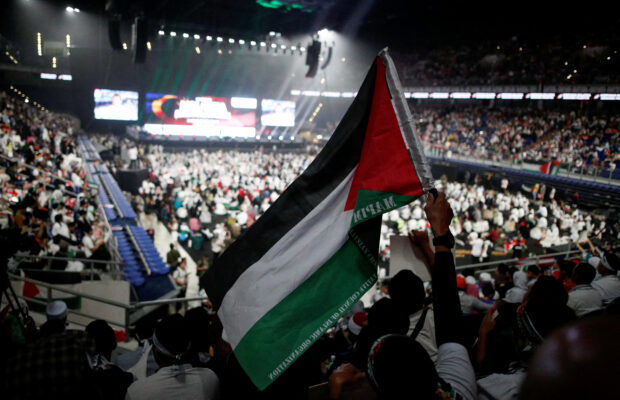
A participant waves the Palestinian flag during a solidarity gathering to show support for Palestinians, amid escalating conflict between Israel and Hamas, in Kuala Lumpur, Malaysia, October 24, 2023. REUTERS/Hasnoor Hussain
GAZA/JERUSALEM — Countries including the United States, Canada, Russia and Arab states pushed for either a pause or ceasefire in fighting between Israel and Hamas in the Gaza Strip so that humanitarian aid could be delivered to besieged Palestinian civilians, and late on Tuesday eight trucks with water, food and medicine entered the enclave from Egypt.
Nearly three weeks after Hamas militants shocked Israel with an attack on southern Israeli towns in a rampage that killed 1,400 mostly civilians, world leaders sought to prevent the conflict from spreading.
U.S. President Joe Biden and Saudi Arabian Crown Prince Mohammed bin Salman spoke by phone on Tuesday and agreed on broader diplomacy “to maintain stability across the region and prevent the conflict from expanding,” the White House said.
Deadly clashes have intensified between the Israeli military and Palestinians in the occupied West Bank, and resurged between Israel and Lebanon’s Iran-backed, heavily armed Hezbollah group along the Israeli-Lebanon border. Any wider conflict would jeopardise security in a region key to global energy supplies.
The U.S. has advised Israel to hold off on a planned ground assault as Washington tries to free more of the 200-plus hostages Hamas is still holding captive in Gaza.
Iran’s U.N. Ambassador Amir Saeid Iravani told the Security Council on Tuesday that U.S. Secretary of State Antony Blinken had attempted to wrongly blame Iran for the Israel-Hamas war.
“Our commitment to regional peace and stability remains unwavering,” he said. “The U.S. has further exacerbated the conflict by overtly aligning itself with the aggressor at the expense of the innocent Palestinian population.”
In a statement released on social media, the Palestinian health ministry said at least 5,791 Palestinians had been killed by Israeli bombardments since Oct. 7, including 2,360 children.
Reuters could not independently verify the ministry figures.
Smoke is rising after an Israeli strike on Gaza seen from a viewpoint in Southern Israel October 24, 2023. REUTERS/Violeta Santos Moura
US, Russia offer rival proposals
At the United Nations, the United States and Russia put forward rival plans on humanitarian aid for Palestinian civilians. Washington has called for pauses and Russia wants a humanitarian ceasefire. A pause is generally considered less formal and shorter than a ceasefire.
“The whole world is expecting from the Security Council a call for a swift and unconditional ceasefire,” Russian U.N. Ambassador Vassily Nebenzia told the Security Council. “This is precisely what is not in the American draft. Therefore, we don’t see any point in it, and we cannot support it.”
Arab states firmly back a call for a humanitarian ceasefire amid widespread destruction of Gaza’s buildings in Israel’s aerial bombardment.
“We followed with regret the inability of this council twice to adopt a resolution or even to call for a ceasefire to end this war,” Egypt’s Foreign Minister Sameh Shoukry told the council.
United Nations Secretary-General Antonio Guterres last week called for an immediate humanitarian ceasefire in Gaza.
“While we remain opposed to a ceasefire, we think humanitarian pauses linked to the delivery of aid that still allow Israel to conduct military operations to defend itself are worth consideration,” a senior U.S. official said.
Eight trucks containing water, food and medicine entered the Gaza Strip from Egypt late on Tuesday, the Palestinian Red Crescent said. The first aid convoy crossed into Gaza from Egypt on Saturday, but U.N. agencies said more than 20 times current deliveries were needed for the narrow coastal strip’s 2.3 million people.
“There are a lot of conversations going on now about the need for humanitarian pauses and I think that’s something Canada supports,” Canadian Prime Minister Justin Trudeau told reporters in Ottawa.
Hospitals running out of fuel
Doctors in Gaza say patients arriving at hospitals are showing signs of disease caused by overcrowding and poor sanitation after more than 1.4 million people fled their homes for temporary shelters.
All hospitals say they are running out of fuel to power their electricity generators, leaving them increasingly unable to treat the injured and ill. More than 40 medical centres have halted operations, a health ministry spokesman said.
UNRWA, the U.N. agency for Palestinian refugees, warned in a post on messaging platform X that it would halt operations in Gaza on Wednesday night because of the lack of fuel.
However, the Israeli military on Tuesday reaffirmed it would bar the entry of fuel to prevent Hamas from seizing it.
Qatari mediators are urging Hamas to quicken the pace of hostage releases to include women and children and to do so without expecting Israeli concessions, said three diplomats and a source in the region familiar with the talks.
The Gulf state, in coordination with the U.S., is leading mediation talks with Hamas and Israel over the release of hostages captured in the group’s Oct. 7 attack.
Hamas has released four hostages – a mother and daughter with dual U.S.-Israel nationality on Friday and two Israeli civilian women on Monday.